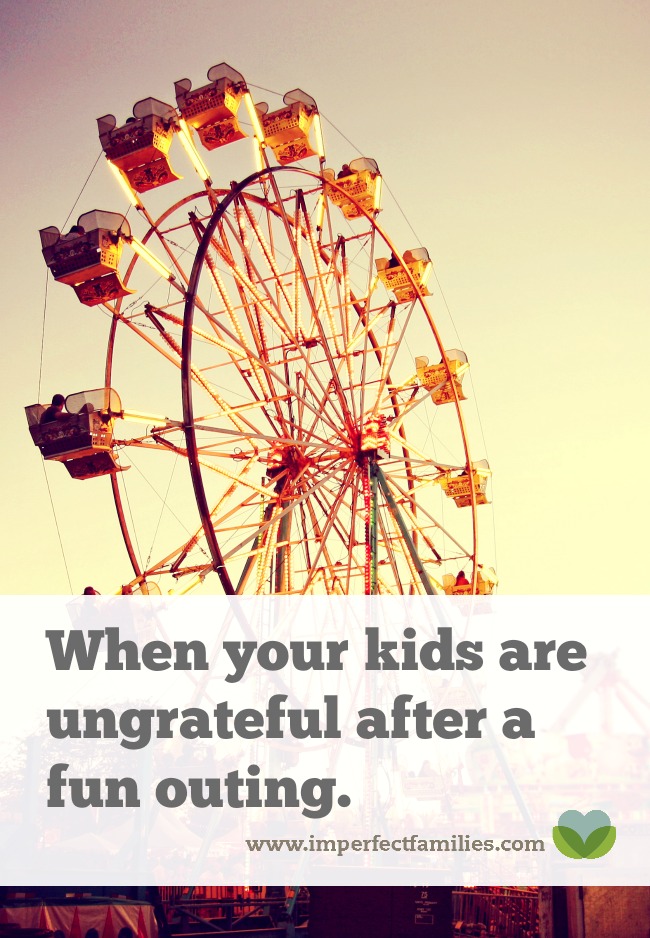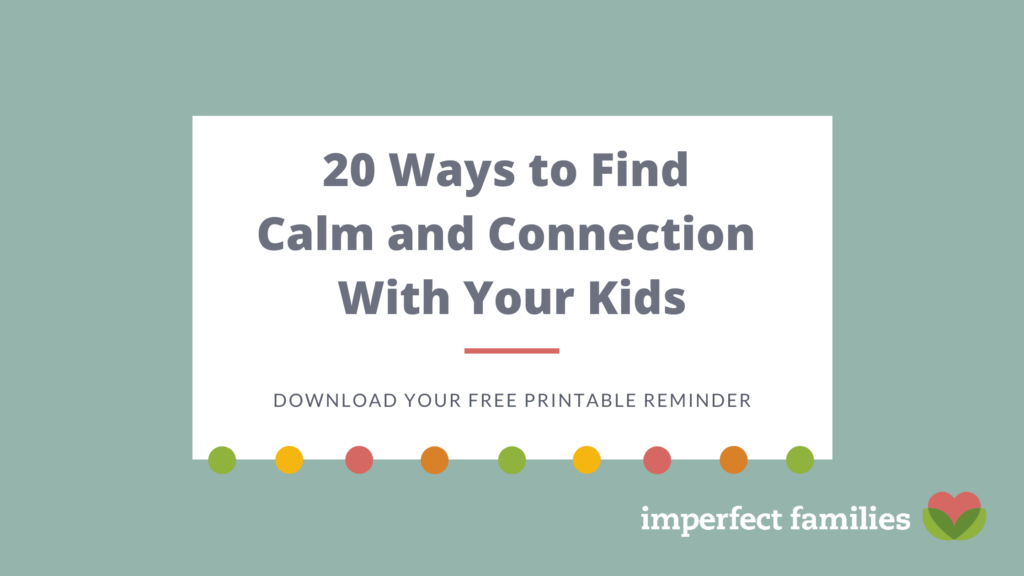Tired of hearing complaining and whining from your kids when you leave a fun activity? Whether it’s Disney World or a trip to Target, these tips will ease the transition and help you teach ungrateful kids to appreciate the things you do as a family.

It’s been a long day at the amusement park. Hot weather. Long lines. Way too much sugar.
The whining starts on the way to the car, “It’s too far. I’m tired…”
And it doesn’t end there.
The kids start to bicker in the backseat. They demand that you stop at a fast food place for dinner. The youngest child starts to cry. You’ve held it together to this point, but you can feel the tension rising.
“Do you have any clue how much money I spent on you today?! Ugh. I’m never taking you anywhere fun again! You are so ungrateful!”
All you wanted was to spend a nice day as a family. But, you should know from past experiences. Nothing ever turns out like you plan.
“Why can’t my kids just be thankful for what they get!?”
Things that lead to ungrateful kids.
Before we talk about how you can change this behavior, first we need to be curious. Take a look at things that are (potentially) impacting your child’s behavior in the heat of the moment.
- Exhaustion: Chances are, everyone is tired. If your child is young, they may have missed a nap or stayed up way too late. Lack of sleep can impact behavior and mood.
- Poor Diet: Eating cotton candy and french fries all day can lead to sluggishness and irritability. Plus, if you were in a hot or busy environment, your kids may be dehydrated.
- Overstimulation: People, music, sounds, smells, and crowded spaces (even if it’s the “happiest place on earth”), can lead to sensory overload for some children.
- Lack of Connection: In the midst of chaos or schedules of the day, your child may be longing for your undivided, personalized connection. Spending time with you in these environments is fun, but it may not fill your child’s need for one-on-one attention.
- Break from Routine: Some children rely heavily on the schedule of a typical day. Breaking this routine, even for something fun, can lead to challenges.
- Difficulty with Transitions: It’s not easy to leave an exciting activity. Your child may not be able to communicate their mixed feelings, and disappointment about the day coming to a close.
- Reserves are Depleted: Your child has worked hard to hold it together, manage waves of big feelings, and (hopefully) make it out of the public eye before melting down. These kids are DONE, they do not have the ability to regulate their emotions anymore today.
Your kids may fit into one or more of these categories.
Be willing to read between the lines, to hear what’s not being said, and assume that these things are going to have a negative impact on their behavior.
(And, be honest, some of these things impact YOUR behavior too!)
Check Your Own Expectations.
OK, so now you know a variety of things that impact your child’s behavior. Next, ask yourself, “Is my child capable of managing a situation like this well? Or, do they need (maturity, routine, sleep, etc).”
Rather than pushing your kids to the brink of what they are capable of, think about your specific child, and adjust your expectations accordingly.
This might mean limiting sweet treats, making time for rest, finding a quiet spot, leaving early, or skipping certain activities.
Even if other kids their age can handle a certain situation without a meltdown, this may not be true for your child. And that’s OK.
Related: Permission to be the parent your child needs.
Talk about it Later.
If every event – even small outings – ends with complaints, it may be time for a family meeting.
If your kids are old enough, engage them in a conversation about leaving events. You can start by saying, “I notice a lot of complaining when we leave activities lately, what’s up?”
Be willing to hear their perspective. If they answer with, “I don’t know,” you may want to mention a few of the things above, “I know I’m exhausted at the end of the day at the beach, can you relate? I wonder what would make it easier to leave when we’re so tired?”
See if you can create a solution that works for everyone. Reevaluate and create new solutions as needed.
Evaluate the Things You Do.
If you’re constantly filling your schedule with fun activities for your kids, and they are often ungrateful, it may be time to explore this further.
- Do you feel obligated or pressured to take your children to these places?
- Do you feel bad or guilty when your kids don’t have these experiences?
- Did you feel “deprived” of these things when you were a kid?
If you answered “yes” (even a tentative “yes”) take time for reflection. How would it feel to skip these events? What would it mean about you as a parent? What will be difficult about your child’s response?
Perhaps a “yes” means it’s time to pull back. To take a break from expensive or over-stimulating activities for a while.
Maybe it’s time to focus on finding simple, meaningful ways to connect with your kids. Especially things that can be done at home or in your own backyard!
There’s nothing wrong with staying home from the circus, avoiding the amusement park, or limiting playdates for a while.
Be Grateful.
Look for opportunities to help your child be thankful and serve others.
Open up your child’s worldview by volunteering at an organization, making a donation, or serving the community. Look for ways to add random acts of kindness into your family’s routine.
Or, simply keep a list of things your child is thankful for, adding to the list every night. Say “thank you” to one another. Write thank you notes as a family.
Shifting the focus from “get-get-get” to gratefulness as a habit may decrease some of the complaining in other areas of your family’s life.
Outings can be fun.
Really.
But it might take some time to interrupt this cycle with your kids.
Be patient.
Tune into your child’s needs. Work on problem-solving and coping strategies. Evaluate your own expectations. And maybe even save the big fun events for another day!
Need more support?
Managing ungrateful kids is not an easy task for parents. If you’re ready to change the pattern in your family but aren’t sure where to start, parent coaching is a great next step. We will talk through your challenges and search for a solution that will bring peace back to your home. Learn more about parent coaching and schedule your appointment today.



Comments have been turned off to retain the privacy of all families. If you have a question or comment on the topic, you're always welcome to contact me.